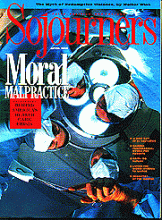Sixty-nine members of the Ecumenical Association of Third World Theologians (EATWOT) - from Africa, Asia, Latin America, and the Caribbean, as well as minority representatives from the United States - gathered in Nairobi, Kenya, in January to discuss the new world order in light of their faith and experience.
The "cry for life" - the theme of the consultation - took many forms: for South African Frank Chikane, it was a cry for freedom; for Korean Hyun-Kyung Chung, a cry for unification. Representatives from other countries were concerned with merely surviving the current unrest in their countries - Zaire, Peru, Sri Lanka, and others. Women theologians, who emerged as full participants, voiced their cry for equality and urged new ways of being the church.
"The cry of the poor was anything but passive," said Judy Diers, an American observer at the conference. "They demonstrated the determination of exploited peoples to actively resist injustice in their countries."
Participants identified criteria by which social structures and economic systems should be judged: justice, equality, freedom, peace, and mutuality in relationships among them. The church was among those structures listed as being in need of transformation.
Native American George Tinker challenged traditional Latin American liberation theology, saying Marxist analysis and class emphasis runs the danger of ignoring the cultural identity of a people. And African and African-American women stressed the need to include gender and race in any dialogue around oppression and justice.
Hope was found in emerging movements of women, blacks, indigenous peoples, the interpretation of the Bible by the poor, as well as peace and ecology movements based on justice for all of creation.
Chris Herman assisted with research.
Read the Full Article

